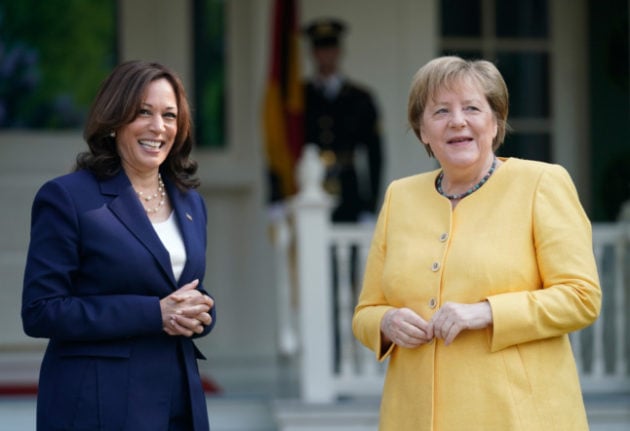Merkel, who has dealt with four US presidents during her premiership and is stepping down later this year, will meet President Joe Biden for an official working visit.
The day kicked off with a breakfast at the Vice President’s residence, where Merkel – the first woman to become Chancellor of Germany – met Kamala Harris, the first black woman to become Vice President.
As the two women talked and laughed, the German Embassy posted a picture of them together, captioned simply: “History.”
History. pic.twitter.com/iwhfXZXKoo
— German Embassy (@GermanyinUSA) July 15, 2021
Harris said on Thursday that she was very honoured to meet Merkel, while the Chancellor stressed the need for the United States and Germany to work together to “strengthen democratic values”.
Following the meeting with Vice President Harris, Merkel will head to the White House at around 8pm Central European Time (CET) for one-on-one talks with Biden, followed by an early dinner.
READ ALSO: Merkel to meet US President Biden in Washington this July
The format of Merkel’s diplomatic visit is intended to “convey gratitude,” a senior Biden administration official said.
However, the White House insists this is “very much a working visit,” rather than a ceremonial farewell for the woman widely seen as Europe’s steadiest leader during almost 16 years at the helm of the continent’s biggest economy.
She and Biden will discuss climate change, Covid-19 vaccine distribution, and the future of Afghanistan now that US, German and other foreign troops are leaving.
Jihadist threats in Africa’s Sahel region are on the agenda, the administration official said.
Reflecting Germany’s pivotal role in NATO and transatlantic security, the two leaders were also set to discuss Russian “cyberattacks and territorial aggression,” Ukraine’s struggle against Russia and “countering China’s rising influence.”
Unresolved issues
However, Merkel is now out of time for resolving some of the pressing issues facing Europe and the United States.
These include the controversial Nord Stream 2 pipeline which is set to funnel Russian natural gas to Germany.
Not only will it bypass Ukraine, leading to fears that Russia is deliberately weakening its neighbour’s economy, but the project underscores European energy dependency on an increasingly hostile Moscow.
Despite strong criticism of the pipeline, Biden in May waived key US sanctions on Nord Stream 2 after concluding that it was too late to stop the project and that it was better to seek cooperation with Germany.
Biden “will raise his long standing concerns” on Thursday, the official said, but clearly there is little in the way of movement that can be expected.
READ ALSO: Merkel calls for new EU-US trade deal
Biden has invited Ukrainian President Volodymyr Zelensky to the White House later this summer.
However, Nord Stream 2 is one of the reasons why Zelensky is nervous about how much he can count on European support against the far more powerful Russians.
On the flip side, Germany’s next leaders will no longer be able to be sure that whoever holds power in the United States after Biden won’t revert to the extraordinary disruption of the Donald Trump era.
“Trump’s raging hostility forced Germany to examine the unhealthy aspects of its dependency on America,” wrote Constanze Stelzenmuller, from the Brookings Institution think tank, in the Financial Times.
By Sebastian Smith




 Please whitelist us to continue reading.
Please whitelist us to continue reading.
Member comments